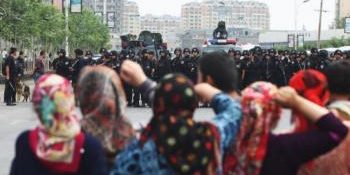In the aftermath of unrest in Urumchi on July 5, 2009, Chinese security forces conducted sweeps of Uyghur neighborhoods in the city arbitrarily detaining Uyghur males. A number of these individuals were forcibly disappeared and to date their whereabouts remain unknown.
Nine years since the unrest, Chinese authorities are enforcing the mass incarceration of Uyghurs in internment camps with many relatives of the detained unsure of the location of their loved ones. UHRP calls on UN member states to condemn the internment camps at China’s upcoming Universal Periodic Review in November.
“It is hard to believe that nine years since the mass detention and enforced disappearances of Uyghurs, we are faced with an escalation of these egregious human violations abuses in East Turkestan. The lack of accountability for the human rights abuses committed in 2009 means the Chinese state has only become emboldened to conduct further acts of violence against Uyghurs,” said UHRP Director Omer Kanat in a statement.
Mr. Kanat added: “It is critical the international community strongly and publicly pressure Chinese officials to end mass detentions of Uyghurs in internment camps. We must act now to prevent the further deterioration of conditions in East Turkestan and purposefully seek ways to guarantee the fundamental rights of Uyghurs.”
On July 5, 2009, Uyghurs peacefully assembled in People’s Square in Urumchi to protest government inaction over a deadly attack on Uyghur factory workers in Shaoguan, Guangdong Province. The details of what happened that day are unclear; however, what is known is the city erupted into unprecedented unrest that resulted in the deaths of an unknown number of people. Reports issued by Amnesty International and the Uyghur Human Rights Project described eyewitness accounts of state security forces firing on peaceful Uyghur protestors.
A report issued by Human Rights Watch in October 2009 documented large-scale sweep operations conducted by security forces in two predominantly Uyghur areas of Urumchi beginning July 6. Human Rights Watch’s report recorded enforced disappearances of 43 Uyghur men. Brad Adams, Asia Director at Human Rights Watch, called the documented disappearances the “tip of the iceberg.” In an article dated May 14, 2012, Radio Free Asia described how 36 Uyghur families had come forward with accounts of missing family members since the July 5, 2009 protest.
Since 2017, China has detained possibly over a million Uyghurs in internment camps. Reports from Radio Free Asia have revealed the extensive nature of the detentions. A December 14, 2017 article disclosed how authorities were holding nearly ten percent of residents in Kona Sheher Township. Two reports published in January 2018 detailed the overcrowded conditions in camps located in Korla and Hotan. According to sources cited by Radio Free Asia in a January 22, 2018 article as many as 120,000 Uyghurs are being held in the Kashgar region. An April 24, 2018 RFA report described how Uyghurs in Ghulja are being detained in five facilities around the city. Almost half of the 34,000 population of Qaraqash village have been in internment camps.
The Globe and Mail interviewed Uyghurs who told reporters how Chinese officials disappeared 80 to 90 individuals from their village into internment camps. One Uyghur female described how local authorities called her husband “on the phone, asking him to come, urgently, to their office. He rode over on a motorcycle. Then, he vanished. There was no trial, no court ruling, no formal charges.”
An October 17, 2017 BuzzFeed article reported a series of Uyghur enforced disappearances. A Uyghur male detailed how: “Friends would vanish in the middle of the night, spirited away by police to political education centers. His neighbors began to disappear, he said, one after the other.” Human Rights Watch researcher, Maya Wang called the internment camps “a form of enforced disappearances in a very organized way.”






